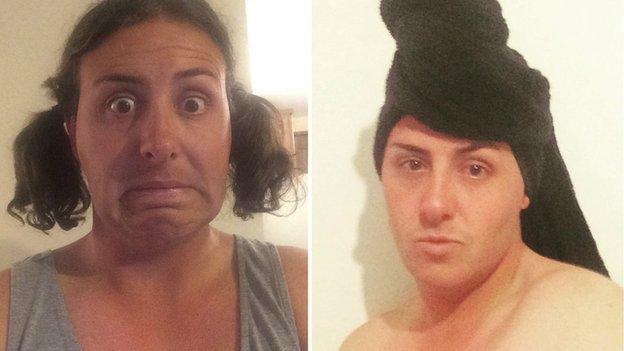Fair Play and May the Best WoMAN Win!
"[Players] should be able to participate as the gender with which they identify and not be subject to requirements for disclosure of personal information beyond those required of cisgender athletes. Nor should there be any requirement for hormonal therapy or surgery."Rugby Canada Guidelines for player inclusion: "I identify as female""She's [trans rugby player Kelly Morgan, 6' tall] going to be a good, good player for the next few years, as long as we can stop her injuring players in training."founder, U.K. rugby team"I do feel guilty, but what can you do? I don't go out to hurt anybody. I just want to play rugby.""I'm always optimistic and I think being open breaks the ice with people. I'm like, 'this is me, this is what I'm going through'.""Times are changing. Hopefully I'll inspire more people to come and play rugby, or any sort of sport."Kelly Morgan/Nicholas Gareth Morgan, transgender rugby player
 |
| 'If you can't take the mick out of yourself, then what's the point?' |
And that data led them to conclude that even following IOC hormone reduction guidelines, genetically male athletes are on average 40 percent heavier, 15 percent faster, 30 percent more physically powerful and 25 to 50 percent stronger than are female athletes; enormous spreads that make a world of difference in the time, and distance measurements distinguishing gold from silver.
Injury to female athletes tends to increase by 30 percent when paired against genetically male competitors. The World Rugby Council issued a resolution on October 9 with respect to transgender participation: "Transgender women may not play women's rugby", representing a first for a sport federation to go its separate way from the IOC on the issue.
Ice Hockey, rugby and ringette are recognized as the riskiest of sports among youth between the ages of five to 19, for brain injuries. Brain injuries account for 27 to 44 percent of all physical harms sustained during games. Yet it is the 'hurt feelings' that may result when "gender identity and gender expression" fail to be given the respect due them that appears to rate.
The safety issue, however, is paramount, or should be, in playing hard-contact sport. Female athletes who compete against genetically male athletes don't necessarily feel safe even in non-contact sports. Three female Connecticut high school runners launched a federal Title 1X lawsuit in reflection of the fact that over three competitive seasons from 2017 to 2019, two genetically male athletes won gold and silver in 15 women's state championship titles.
The U.S. Department of Education Office for Civil Rights agreed that Franklin Pierce University in New Hampshire's transgender sports and inclusion policy violated Title 1X prohibiting discrimination in educational programs and activities on the basis of sex. This was a resolution of a civil rights claim brought by Concerned Women for America. The upshot was that FPU agreed to "rescind its Transgender Participation and Inclusion Policy and will cease any and all practices related thereto".
The complaint originated when transathlete CeCe Telfer competed in the 400m hurdles on the men's team in 2015 and 2017, ranking 390th in NCAA Division 2, then in 2018 he self-identified as a woman and became eligible to compete against women according to NCAA rules. He won the women's national championship in June 2020. His win was ascribed by his coach to attitude: "I've never met anyone as strong as her mentally in my life".
/cdn.vox-cdn.com/uploads/chorus_image/image/63940812/Telfer_NCAA.0.png) |
"But there are all these disadvantages of competing in the 100 hurdles, you know?""First of all, my height, how tall I am, is a disadvantage, because the wind is hitting us so hard and the taller you are, the harder you fall, basically. There’s wind resistance.""[Another disadvantage:] The fact that the hurdles are so close. [smaller in women’s competition; six inches shorter than in men’s races, but more than half a meter closer together]."“And there are people who say I have the benefit of testosterone. But no: I have no benefit. I’m on hormone suppression, it doesn’t help. It’s another disadvantage. Cis women are producing more testosterone than the average trans female.""So it’s crazy! I’m the crazy one, to be the weakest female, the weakest link in the chain, to be competing against the top ones. I should be fingered as the stupid one, for wanting to do that in the first place."CeCe Telfer, transgender athlete
The IOC has allowed biological males since 2015, self-identifying as female for a year to compete in women's sport as long as they reduce their testosterone levels to 10 nmol/1, higher as it happens, than the female testosterone range of .54 to 2.4 nmol/1. So much for testosterone comparability.
:no_upscale()/cdn.vox-cdn.com/uploads/chorus_asset/file/16316217/Telfer_Height.png) |
Labels: Competitive Sports, Fairness, Gender Differentials, Injuries, Transgender Females

0 Comments:
Post a Comment
<< Home